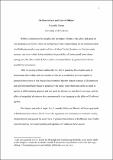On benevolence and love of others
Abstract
Hobbes is famous for his insights into the impact of man’s fear, glory and greed on war and peace, not for his views on the bearing of men’s benevolence on the commonwealth. Are Hobbesian people even capable of love of others? In the literature, we find two main answers: one view is that Hobbes ruled out the possibility of disinterested benevolence among men; the other is that Hobbes considered actions driven by genuine benevolence possible but uncommon. After reviewing in broad outlines the two above positions, this chapter seeks to demonstrate the claim that Hobbes did not consider relevant to establish if men are capable of genuine benevolence or not, because he maintained that benevolent men can be as inept as egoists in differentiating apparent and real good for themselves and their loved ones and the effect of misguided altruism on the commonwealth is as damaging as the effect of ill-advised egoism.
Citation
Slomp , G 2019 , On benevolence and love of others . in S A Lloyd (ed.) , Interpreting Hobbes's political philosophy . Cambridge University Press , pp. 106-123 . https://doi.org/10.1017/9781108234870.007
Publication
Interpreting Hobbes's political philosophy
Type
Book item
Collections
Items in the St Andrews Research Repository are protected by copyright, with all rights reserved, unless otherwise indicated.

